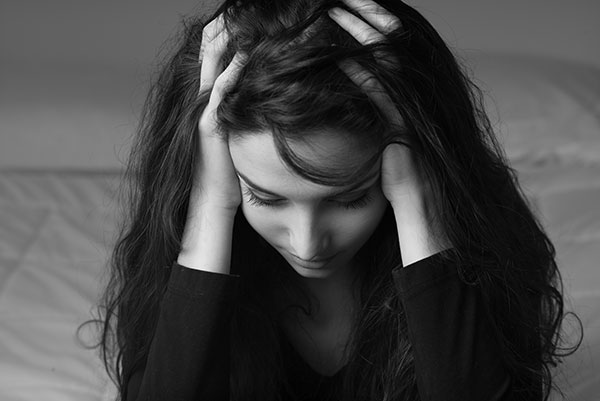Fears are part of human life. But they can get out of hand and become pathological. Various anxiety disorders can be very limiting to functioning in life, often for a long time. However, there are different methods that you can use to learn get over your anxiety and get back to a normal life. What? Check it out.
Table of contents:
What is anxiety?
Symptoms of anxiety
Anxiety symptoms
Types of anxiety
Causes of anxiety
How to overcome anxiety?
Anxiety disorders and psychological support
What is anxiety?
Do you often feel anxious about certain things? In fact, having low levels of these feelings is normal and may even help you in certain situations, give you the motivation to act you need. Anxiety is an emotional state that arises in response to a threat, but is usually exaggerated and subjective. In fact, we all have the ability to feel fear. However, if anxiety can affect your ability to function daily, enlisting the help of a psychologist can help you regain control of your life and your anxiety.
Symptoms of anxiety
Most people who struggle with anxiety report typical physical symptoms of anxiety , which may include:
- rapid heartbeat,
- racing thoughts,
- dry mouth,
- upset stomach,
- trembling hands , limbs and even the whole body,
- sweating,
- shortness of breath,
- dizziness,
- tingling in the extremities,
- li>
- sleep problems such as insomnia or frequent waking.
Besides there are other common anxiety symptoms such as:
- persistent and uncontrolled worry,
- avoiding people, places or things
- feeling scared,
- nervous or panic symptoms
- irritable, agitated, tense or nervous.
Anxiety that requires treatment can manifest itself very rapidly, on the one hand, as a panic attack that seems to come out of nowhere and is accompanied by shortness of breath and restlessness, as well as dizziness and even fear of death. On the other hand, pathological fears can also run “in silence”. They then emerge as exhausting thoughts that cannot be controlled or remedied, as well as clear, catastrophic worries in everyday situations. Persistent physical tension and a concomitant inability to relax appear alongside other symptoms of physical stress. In people with anxiety disorders , these symptoms and related anxiety occupy such a large area of their thoughts that everyday functioning in various situations is seriously disturbed.
Anxiety – symptoms

People who struggle with anxiety also tend to report certain thought patterns that they may induce or worsen symptoms of anxiety . People with panic disorder tend to feel overly anxious about normal physical events (e.g., increased heart rate, changes in breathing, dizziness, etc.). These symptoms can make them think, “I’m going to have a heart attack,” “I’m going crazy”, or “I’m going to die.”
In social anxiety disorder or social anxiety disorder, people who suffer from the disorder tend to be overly anxious about the perceived judgment of others and what that judgment may mean. They may be afraid of saying the wrong thing, not knowing what to say in a social situation, or they may be afraid that others will notice their anxiety. Any anxiety states has its own map of typical thinking patterns which, with the help of a good psychologist, you will be able to better understand, manage and overcome them.
Kinds of anxiety
There are five main types of anxiety disorders :
- Generalized Anxiety Disorder, Generalized Anxiety Disorder: People with this disorder are constantly worried about everyday things or what may happen in the future. There is a persistent, excessive, unrealistic fear of a potential misfortune such as financial loss, illness, adversity for one’s own children, or a combination of all those misfortunes.
- Post-traumatic stress disorder (PTSD): is an anxiety disorder that usually occurs after experiencing or witnessing a traumatic event. People with PTSD may feel haunted by persistent memories, dreams and images, as well as flashbacks to traumatic events. There are known stories of soldiers who returned from wars who developed post-traumatic stress disorder. However, it can be triggered by any other traumatic event, such as witnessing a crime or participating in a car accident.
- Phobic anxiety disorder (agoraphobia, social phobias, specific forms of phobias, other phobic anxiety disorders). One of the most commonly diagnosed is social phobia. This type of anxiety can cause anxiety or concern about social interactions. It can be triggered by or in anticipation of a specific social gathering, or by various social situations in general.
- Obsessive Compulsive Disorder: is a sub-type of anxiety disorder. It is the repetition of deliberate, stereotypical activities such as compulsive hand washing, and / or the constant return of unwanted, intrusive, unacceptable, or disgusting thoughts.
- Panic attacks : are an extreme anxiety reaction, during which people experience a sudden and intense period of the body’s anxiety reaction – uncontrolled rapid, shallow breathing, increased heart rate, and sweating. Attacks usually last 5 to 10 minutes and can be extremely scary. People often think they are having a heart attack, they can’t breathe. After such an experience, there is often “fear of fear.” That’s when you start to worry about another panic attack.
Causes of anxiety
Overall, anxiety can come up for many different reasons, or it may seem to come out of nowhere. Where the cause is not clear to you, it may be helpful to talk to a therapist who is more familiar with the most common anxiety triggers.
Some of the most common causes of anxiety include:
- constant stress (e.g. pressure at work or in family life),
- stress related to specific situations (e.g. job loss or moving),
- experiencing violence in childhood (physical, psychological or sexual),
- witnessing or participating in a traumatic event,
- drug use.
Often these are unpredictable events over which you have no control over them cause immediate anxiety and make you susceptible to anxiety responses in the future. Sometimes psychological causes of anxiety are also sought in patterns of behavior in strange and dangerous situations, developed in the early stages of life. They also foster the development of automatic thoughts focused on possible threats.
How to overcome anxiety?
There are many daily things you can do to deal with anxiety and reduce or better manage it. You can use:
Exercise: is effective in reducing and overcoming anxiety. Exercise is a distraction and releases tension. If you get irritated or angry easily, vigorous exercise such as jogging, boxing or squash will release the pent-up tension. However, milder forms of exercise, such as yoga, pilates, tai chi, etc., will help regulate your breathing and promote relaxation. Vigorous exercise is sometimes recommended for people who suffer from panic attacks as you will begin to realize that being out of breath is not a sign of heart failure but is completely natural and safe.
Breathing techniques: using them to prepare for situations that cause anxiety can be very helpful. Find yourself a comfortable place to sit or lie down. Close your eyes. Breathe in slowly, counting to 5 in your head, then exhale and count to 5 in your head. Repeat this process for 5 minutes or until your anxiety is reduced.
Meditation: Practicing it can reduce anxiety and other psychological stresses. Just sit cross-legged on the floor. Close your eyes and recite, aloud or to yourself, a mantra. The mantra can be any positive statement or sound you choose. Try to synchronize the mantra with your breath. If your mind is drifting to distracting thoughts, don’t get frustrated. Just concentrate and keep going. Try this practice for a few minutes each day and it will be an easy and accessible tool to help you calm down and distract you from your fears.
Also, if you want to combat or learn to control your fears:
- Accept that there are things you cannot control.
- Focus on the present instead of the unknown future.
- Learn to recognize anxiety triggers. Knowing what causes anxiety can help you develop coping mechanisms and prevent symptoms.
- Get involved in charity. Find a way to volunteer or be active in your local community.
- Take a moment during the day to relax and focus. Take a walk, listen to music, get a massage, or practice yoga.
- Limit your caffeine and alcohol intake, which are energizing and can cause physical symptoms similar to anxiety attacks, such as an increased heart rate.
- Eat healthy and regularly. Skipping meals may promote a drop in blood sugar. Low blood sugar can make you anxious as your body produces more cortisol in response to stress.
- Get enough sleep because adequate sleep helps your body deal with stress.
Anxiety disorders and psychological support

Don’t be afraid to talk about your fears with friends, family, doctor or therapist. Because anxiety stems from irrational fear thoughts, suffering silently can make your anxiety worse. Anxiety disorders are serious mental illnesses which cause a high level of suffering to those affected.
People with anxiety disorders experience anxiety because of the insecurity felt at a deeper, existential level that escapes rational consideration and controlled action. If it is a terrible experience, it causes a lot of suffering and a lot of limitations. Therefore, psychological consultation and behavioral therapy, in particular cognitive behavioral therapy, which is particularly effective in treating anxiety disorders is necessary if you cannot cope with your fears. Don’t wait, the sooner anxiety disorder is cured, the better your chances of improving your life and health.
